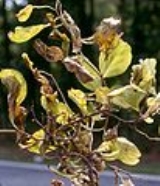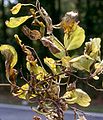
List of elm diseases
Encyclopedia
Bacterial diseases
| Bacterial diseases |
|
|---|---|
| Bacterial wetwood | Enterobacter nimipressuralis = Erwinia nimipressuralis Bacillus megaterium Bacillus megaterium Bacillus megaterium is a rod-shaped, Gram-positive, endospore forming, species of bacteria used as a soil inoculant in agriculture and horticulture.Bacterium is arranged into the streptobacillus form.... Pseudomonas fluorescens Pseudomonas fluorescens Pseudomonas fluorescens is a common Gram-negative, rod-shaped bacterium. It belongs to the Pseudomonas genus; 16S rRNA analysis has placed P. fluorescens in the P. fluorescens group within the genus, to which it lends its name.... |
| Discoloration (xylem) | Bacteria |
| Elm leaf scorch | Xylella fastidiosa Xylella fastidiosa Xylella fastidiosa, a bacterium in the class Gammaproteobacteria, is an important plant pathogen that causes phoney peach disease in the southern United States, oleander leaf scorch, and Pierce's disease, and citrus variegated chlorosis disease in Brazil.-Pierce's disease:Pierce's disease was... |
Fungal diseases
| Fungal diseases |
|
|---|---|
| Anthracnose | Asteroma inconspicuum Asteroma inconspicuum Asteroma inconspicuum is a plant pathogen that causes anthracnose on elm.- External links :* *... = Gloeosporium inconspicuum Gloeosporium ulmicola |
| Armillaria root rot Shoestring root rot |
Armillaria mellea Armillaria mellea Armillaria mellea is a plant pathogen and a species of Honey fungus. It causes Armillaria root rot in many plant species. The mushrooms are edible but some people may be intolerant to them. The fungus produces mushrooms around the base of trees it has infected... Rhizomorpha subcorticalis Rhizomorpha subcorticalis Rhizomorpha subcorticalis is a fungus that is a plant pathogen that causes root rot in several species, including strawberries and avocado.- External links :* *... [anamorph] |
| Blackspot | Asteroma ulmeum = Gloeosporium ulmeum Stegophora ulmea Stegophora ulmea Stegophora ulmea is a plant pathogen.- External links :* *... [teleomorph] = Gnomonia ulmea |
| Botryodiplodia canker | Sphaeropsis ulmicola = Botryodiplodia hydrodermia |
| Botryosphaeria canker | Botryosphaeria dothidea Botryosphaeria dothidea Botryosphaeria dothidea is a plant pathogen that causes the formation of cankers on a wide variety of tree species.- External links :**... Fusicoccum aesculi Fusicoccum aesculi Fusicoccum aesculi is a fungus. It is a plant pathogen.- External links :**... [anamorph] |
| British tar spot | Dothidella ulmi |
| Chalara root rot | Chalara thielavioides |
| Coniothyrium canker | Coniothyrium spp. Coniothyrium celtidis-australis Coniothyrium celtidis-australis Coniothyrium celtidis-australis is a plant pathogen.- External links :* *... Coniothyrium fuckelii Diapleella coniothyrium [anamorph] |
| Cytospora canker | Cytospora chrysosperma Valsa sordida [anamorph] Cytospora leucosperma = Cytospora ambiens Valsa ambiens Valsa ambiens Valsa ambiens is a plant pathogen.- External links :* *... [anamorph] Cytospora nivea Leucostoma nivea [anamorph] |
| Cytosporina canker | Cytosporina ludibunda Cytosporina ludibunda Cytosporina ludibunda is an ascomycete fungus that is a plant pathogen.- External links :* *... |
| Damping-off, Fusarium | Fusarium Fusarium Fusarium is a large genus of filamentous fungi widely distributed in soil and in association with plants. Most species are harmless saprobes, and are relatively abundant members of the soil microbial community. Some species produce mycotoxins in cereal crops that can affect human and animal health... spp. |
| Damping-off, Pythium | Pythium ultimum Pythium ultimum Pythium ultimum is a plant pathogen.- External links :***... |
| Damping-off, Rhizoctonia | Rhizoctonia solani Rhizoctonia solani Rhizoctonia solani is a plant pathogenic fungus with a wide host range and worldwide distribution. This plant pathogen was discovered more than 100 years ago. Rhizoctonia solani frequently exists as thread-like growth on plants or in culture. Asexual spores are not produced, only the sexual stage... Thanatephorus cucumeris [teleomorph] |
| Decay (xylem) | Trametes versicolor Trametes versicolor Trametes versicolor — formerly known as Coriolus versicolor and Polyporus versicolor — is an extremely common polypore mushroom which can be found throughout the world. Versicolor means 'of several colours' and it is true that this mushroom is found in a wide variety of different colours. T... = Coriolus versicolor Flammulina velutipes Ganoderma applanatum Ganoderma applanatum Ganoderma applanatum is a bracket fungus with a cosmopolitan distribution.The spore bodies are up to 30-40 cm across, hard, woody-textured, and... = Fomes applanatus Phellinus Phellinus Phellinus is a genus of fungi in the family Hymenochaetaceae. Many species cause white rot. Fruiting bodies, which are found growing on wood, are resupinate, sessile, and perennial. The flesh is tough and woody or cork-like, and brown in color. Clamp connections are absent, and the skeletal hyphae... spp. = Fomes Fomes Fomes is a genus of perennial woody fungi in the family Polyporaceae. Species are typically hoof-shaped . New growth each season is added to the margin, resulting in a downward extension of the hymenium. This often results in a zonate appearance of the upper surface, that is, marked by concentric... spp. Pleurotus Pleurotus Pleurotus is a genus of gilled mushrooms which includes one of the most widely eaten mushrooms, P. ostreatus. Species of Pleurotus may be called oyster, abalone, or tree mushrooms, and are some of the most commonly cultivated edible mushrooms in the world... spp. Polyporus squamosus Polyporus squamosus Polyporus squamosus is an basidiomycete bracket fungus, with common names including Dryad's saddle and Pheasant's back mushroom. It has a widespread distribution, being found in North America, Australia, Asia, and Europe, where it causes a white rot in the heartwood of living and dead hardwood trees... Other basidiomycetes |
| Discoloration (xylem) | Deuteromycetes |
| Dothiorella canker and wilt | Dothiorella ulmi Dothiorella ulmi Dothiorella ulmi is a plant pathogen that causes die-back of elm. It was first identified in 1929 on American elm and was thought to belong to the order Sphaeropsidales but was later described as Cephalosporium sp. before formally being identified as Dothiorella ulmi in 1937.- External links :**... |
| Dutch elm disease | Ophiostoma ulmi Ophiostoma ulmi Ophiostoma ulmi is a species of fungus in the Ophiostomataceae family. It is one of the causative agents of Dutch elm disease. It was first described under the name Graphium ulmi, and later transferred to the genus Ophiostoma.... = Ceratocystis ulmi Pesotum ulmi [anamorph] = Graphium ulmi Ophiostoma novo-ulmi |
| Leaf blister | Taphrina ulmi |
| Mistletoe (infection) | Phoradendron serotinum = Phoradendron flavescens Phoradendron tomentosum Phoradendron tomentosum Leafy Mistletoe, Phoradendron tomentosum is a plant parasite. It is characterized by its larger leaves and smaller berries than dwarf mistletoe. Leafy mistletoe seldom kill but they do rob their hosts of moisture and some minerals, causing stress during drought and reducing crop productions on... Viscum album Viscum album Viscum album is a species of mistletoe, the species originally so-named, and also known as European Mistletoe or Common Mistletoe to distinguish it from other related species... |
| Nectria canker | Nectria Nectria This article is about a genus of fungi. For the echinoderm genus, see Nectria .Nectria is a genus of Ascomycete fungi. They are most often encountered as saprophytes on decaying wood but some species can also occur as parasites of trees, especially fruit trees and a number of other hardwood trees... spp. Nectria cinnabarina Nectria cinnabarina Nectria cinnabarina is a plant pathogen that causes cankers on many tree species and also a disease known as coral spot.- External links :* *... Tubercularia vulgaris [anamorph] Nectria coccinea Nectria coccinea Nectria coccinea is a fungal plant pathogen. The variant Nectria coccinea var. faginata causes beech bark disease, and can infect the tree via the feeding holes made by the beech scale insect Cryptococcus fagisuga.- External links :* *... Cylindrocarpon candidum Cylindrocarpon candidum Cylindrocarpon candidum is a fungal plant pathogen that causes cankers on elm.- External links :* *... [anamorph] Nectria ditissima Nectria ditissima Nectria ditissima is a fungal plant pathogen.- External links :* *... Cylindrocarpon willkommii [anamorph] Nectria galligena Cylindrocarpon heteronemum [anamorph] |
| Phoma canker | Phoma glomerata Phoma glomerata Phoma glomerata is a plant pathogen.- External links :**... = Phoma conidiogena |
| Phomopsis canker | Phomopsis oblonga Diaporthe eres Diaporthe eres Diaporthe eres is a plant pathogen.- External links :* * - References :... [teleomorph] |
| Phymatotrichum root rot (cotton root rot) | Phymatotrichopsis omnivora = Phymatotrichum omnivorum |
| Phytophthora canker (pit canker) | Phytophthora inflata Phytophthora inflata Phytophthora inflata is a plant pathogen. It was first identified in 1949 in Michigan, USA causing a pit canker on elm trees. It was found in the UK in 1992 in the roots of Sambucus tenuifolium and Lilac , in 2003 it was found in a UK nursery infecting a Rhododendron ponticum... |
| Phytophthora root rot | Phytophthora megasperma Phytophthora megasperma Phytophthora megasperma is a plant pathogen.- External links :* *... |
| Powdery mildew | Microsphaera penicellata = M. alni Phyllactinia angulata Phyllactinia angulata Phyllactinia angulata is a plant pathogen.- External links :* *... = Phyllactinia corylea var. angulata Phyllactinia guttata Phyllactinia guttata Phyllactinia guttata is a species of fungus in the Erysiphaceae family; the anamorph of this species is Ovulariopsis moricola. A plant pathogen distributed in temperate regions, P... Oidium Oidium This article is about a type of fungal spore. For the ascomycete genus, see Oidium . For the fungus that causes powdery mildew on grapes, see Uncinula necator.... sp. [anamorph] Uncinula macrospora Uncinula macrospora Uncinula macrospora is a plant pathogen that causes a powdery mildew disease of certain North American trees. Its hosts include various elms , hackberries , and American hop hornbeam Ostrya virginiana.- External links :... Uncinula parvula Uncinuliella flexuosa |
| Schizoxylon canker | Schizoxylon microsporum |
| Sooty mold | Perisporiaceae (Ascomycetes): numerous dark-spored fungi imperfecti |
| Thyrostroma canker | Stigmina compacta = Thyrostroma compactum Thyrostroma compactum Thyrostroma compactum is an Botryosphaeriaceae fungus that is a plant pathogen.- External links :* *... |
| Tubercularia canker | Tubercularia ulmea Tubercularia ulmea Tubercularia ulmea is a fungal plant pathogen.- External links :* *... |
| Verticillium wilt | Verticillium albo-atrum Verticillium albo-atrum Verticillium albo-atrum is a plant pathogen.-External links:* *... Verticillium dahlia |
| Violet root rot | Helicobasidium brebissonii Helicobasidium brebissonii Helicobasidium purpureum is a plant pathogen. It contains 3 variations.-Variations:*Helicobasidium purpureum var. barlae Bres. 1909*Helicobasidium purpureum var. orientalePat. 1920*Helicobasidium purpureum var. purpureum Pat. 1885... Rhizoctonia crocorum [anamorph] |
Miscellaneous diseases and disorders
| Miscellaneous diseases and disorders |
|
|---|---|
| Discoloration (xylem) | Actinomycetes |
Nematodes, parasitic
| Nematodes, parasitic |
|
|---|---|
| Lance | Hoploliamus spp. |
| Ring | Criconemella spp. |
| Root-knot | Meloidoglyne spp. |
| Spiral | Helicotylenchus Helicotylenchus Helicotylenchus is a genus of nematodes in the family Hoplolaimidae.-Diagnosis:Hoplolaimidae. Female : Body vermiform, spiral to straight. Labial region continuous to slightly offset, rounded or anteriorly flattened, generally annulated but never longitudinally striated; anterior lip annulus... spp. |
| Stunt | Tylenchorhynchus Tylenchorhynchus Tylenchorhynchus is a genus of nematodes including many species of plant parasites. The classification of stunt nematodes - those including the Tylenchorhynchus genus - is unstable; many newly discovered species within this genus are reconsidered to be actually subspecies... spp. |
Virus and Phytoplasma diseases

| Virus and mycoplasmalike organism [MLO] diseases |
|
|---|---|
| Elm mosaic | Elm mosaic virus |
| Elm mottle | Elm mottle virus Elm mottle virus Elm mottle virus is a plant pathogenic virus of the family Bromoviridae.-External links:**... |
| Elm stripe | Viruslike |
| Elm witches' broom | Phytoplasma (graft-transmissible) |
| Elm Yellows Elm Yellows Elm Yellows is a plant disease of elm trees that is spread by leafhoppers or by root grafts. Elm Yellows, also known as Elm Phloem Necrosis, is very aggressive, with no known cure. Elm Yellows occurs in the Eastern United States and southern Ontario in Canada. It is caused by phytoplasmas which... (phloem necrosis) |
Phytoplasma (graft-transmissible) |
| Zonate canker | Virus (graft-transmissible) |

